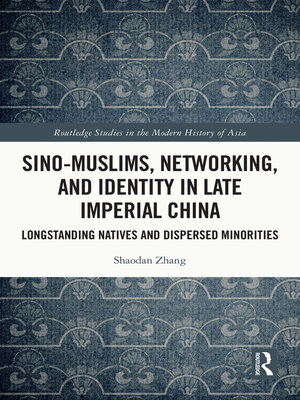Sino-Muslims, Networking, and Identity in Late Imperial China
ebook ∣ Longstanding Natives and Dispersed Minorities · Routledge Studies in the Modern History of Asia
By Shaodan Zhang

Sign up to save your library
With an OverDrive account, you can save your favorite libraries for at-a-glance information about availability. Find out more about OverDrive accounts.
Find this title in Libby, the library reading app by OverDrive.



Search for a digital library with this title
Title found at these libraries:
| Library Name | Distance |
|---|---|
| Loading... |
This book explores the everyday life of Muslims in late imperial China proper ("Sino-Muslims"), revealing how they integrated themselves into Chinese society, while also maintaining distinct Islamic features.
Deeming "identity" as practical, interactive, and processual, it focuses on Sino-Muslims' daily networking practices which embodied their numerous processes of identification with people around them. Through an evaluation of such practices, it displays how, since the early seventeenth century, Sino-Muslims vigorously formed and participated in popular religious and secular networks at local, translocal, and China-wide scales, including mosques, merchant associations, gentry groups, Islamic educational and publishing networks. It demonstrates how such networks facilitated Sino-Muslims to become more aligned with the tempo of change in Chinese society and imperial governance, and created for them more ingenious venues and means to identify with Islam. Ultimately it reveals how, by the first half of the nineteenth century, a sense of collectivity—with common knowledge, memory, and discourse—was generated among dispersed Sino-Muslims.
Utilizing Sino-Muslims' own records such as steles, genealogies, and Chinese Islamic texts, this book will be of interest to scholars and students of comparative Muslim studies, Qing and early modern China, religious and ethnic identity, and professionals of Sino-Arab relations.







